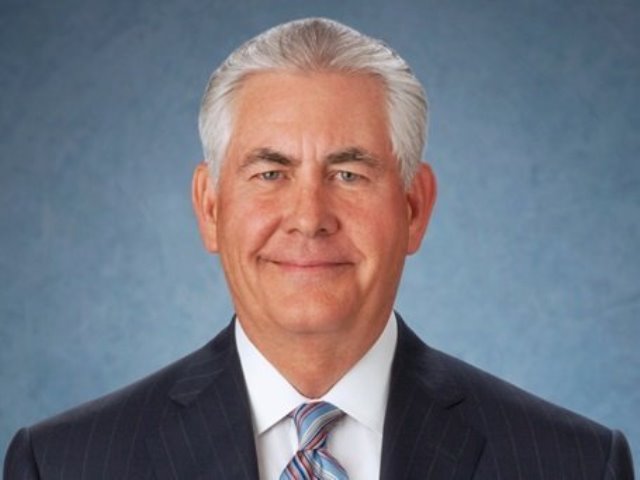Secretary of State Rex Tillerson arrives Wednesday in Mexico, formerly one of the more stress-free work trips the top US diplomat could take.
No more.
President Donald Trump’s rhetoric and policies have cranked up the tension in US-Mexico relations to a high not seen in decades. He’s blamed the country for sending rapists into the US, castigated undocumented immigrants from across the border and blasted Mexico for what he says are unfair trade practices. One of Trump’s first actions as president was to order the construction of a wall that he insists Mexico will pay for, despite the country’s repeated refusals.
In response, consumers south of the border are boycotting US brands and goods and lawmakers have introduced a bill to stop buying US corn. Mexicans staged massive anti-US protests Sunday, forming human chains along the border where Trump would like to build a wall. And President Enrique Peña Nieto canceled a planned trip to Washington to meet with Trump in apparent frustration.
That’s the backdrop as Tillerson and Homeland Security Secretary John Kelly arrive in Mexico for meetings with Peña Nieto, Mexican ministers and military officials. The trip is meant to allow the new US Cabinet members to establish relationships and coordinate on bilateral issues that range from counterterrorism, border security, immigration and trade that amounts to $1.5 billion a day. But the secretaries make their debut under a cloud.
“Today’s rhetoric is forcing Mexicans everywhere to question the unquestionable: Did the country make a mistake 25 years ago by betting its future on North America?” asked Peter Schecter, director of the Adrienne Arsht Latin America Center at the Atlantic Council. “No relationship is perfect, and there is much to develop and improve in Mexico. But by ostracizing our neighbor, we are in imminent danger of dismantling the North American experiment we’ve built over the last 20-plus years.”
In a reflection of how broad the US-Mexico relationship is, Tillerson and Kelly will meet with the Mexican ministers of Interior, Foreign Relations, Finance, National Defense and Navy.
Their trip takes place a day after the Trump administration announced new and aggressive immigration enforcement procedures that could dramatically expand the number of people detained and deported, and directly impact Mexico.
The Obama administration prioritized the deportation of people with criminal convictions; the new Trump administration guidance on deportations could apply to every undocumented immigrant in the US and enable state and local law enforcement to act as immigration officers.
Another change to asylum procedures would make it easier for immigration officers to send non-Mexican migrants to Mexico if they came through the country on their way to the US. The change could potentially send tens of thousands of Central Americans fleeing violence, gangs and drug cartels back into Mexico, an issue Kelly and Tillerson will almost certainly have to address.
The day in Mexico City will represent the first known high-level meetings between the US and Mexican officials since Peña Nieto canceled a visit to Washington on January 27 after Trump declared that there was no point in his coming if Mexico wouldn’t agree to pay for a border wall.
“Unless Mexico will treat the US fairly, with respect, such a meeting is fruitless, and I want to go a different route,” Trump told GOP lawmakers at a retreat in Philadelphia. “I have no choice.”
He went on to say that “border security is a serious, serious issue and a national problem. Most illegal immigration is coming from our southern border.”
The issue of illegal immigration was a major campaign theme for Trump, who framed it as an economic and security challenge threatening the US. One of his first acts as president was to sign two executive orders for construction of a US-Mexico border wall and increasing the number of border patrol officers and immigration enforcement officers who carry out deportations.
During the campaign, Trump went to Mexico City to meet Peña Nieto and said he discussed the wall but not who would pay for it — a claim the Mexican president disputed. Peña Nieto took to Twitter after the meeting to say that “I made it clear that Mexico will not pay for the wall.”
Still, the meeting was a political debacle for the Mexican leader, and the nationalist backlash against Trump is bolstering the political fortunes of leftist candidate Andres Manuel Lopez Obrador, who Schecter noted now leads national polls on the 2018 election.
Trump has also railed against Mexico and the North American Free Trade Agreement, which he has described in tweets as “a one-sided deal from the beginning of NAFTA with massive numbers … of jobs and companies lost” that has created a trade deficit. He has repeatedly said he wants to renegotiate the deal, which many experts agree wouldn’t be a bad thing, given that it was originally written at a time when intellectual property, the Internet and e-commerce weren’t major economic drivers.
Schecter pointed out that the economies of the three NAFTA countries — the US, Canada and Mexico — are so intertwined that cross-border production chains “mean 40 cents’ worth and 25 cents’ worth of every dollar we import from Mexico and Canada, respectively, is US content.”
“President Trump is right, NAFTA should be updated,” said Schecter. “But not in an atmosphere of recrimination.”
